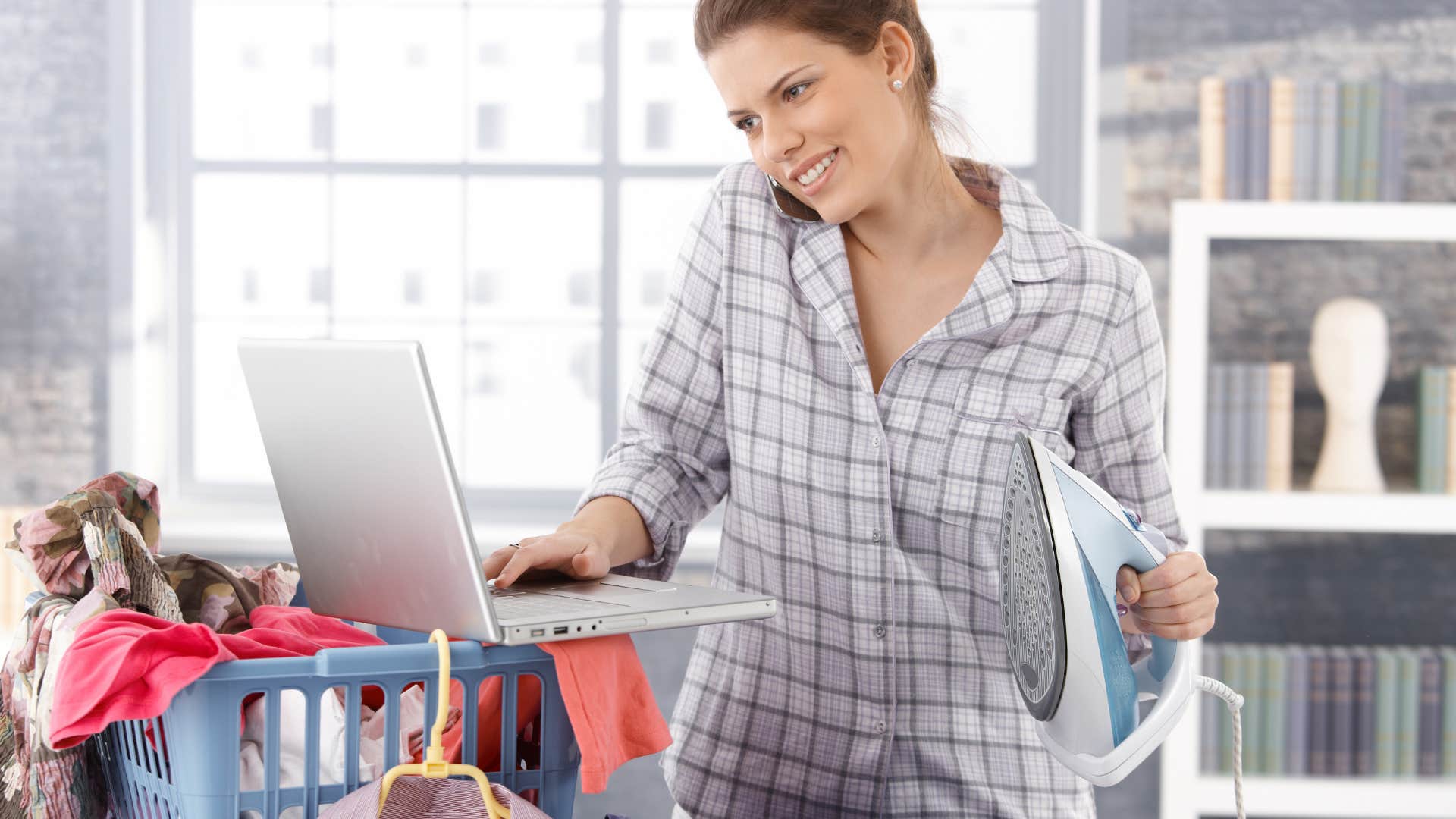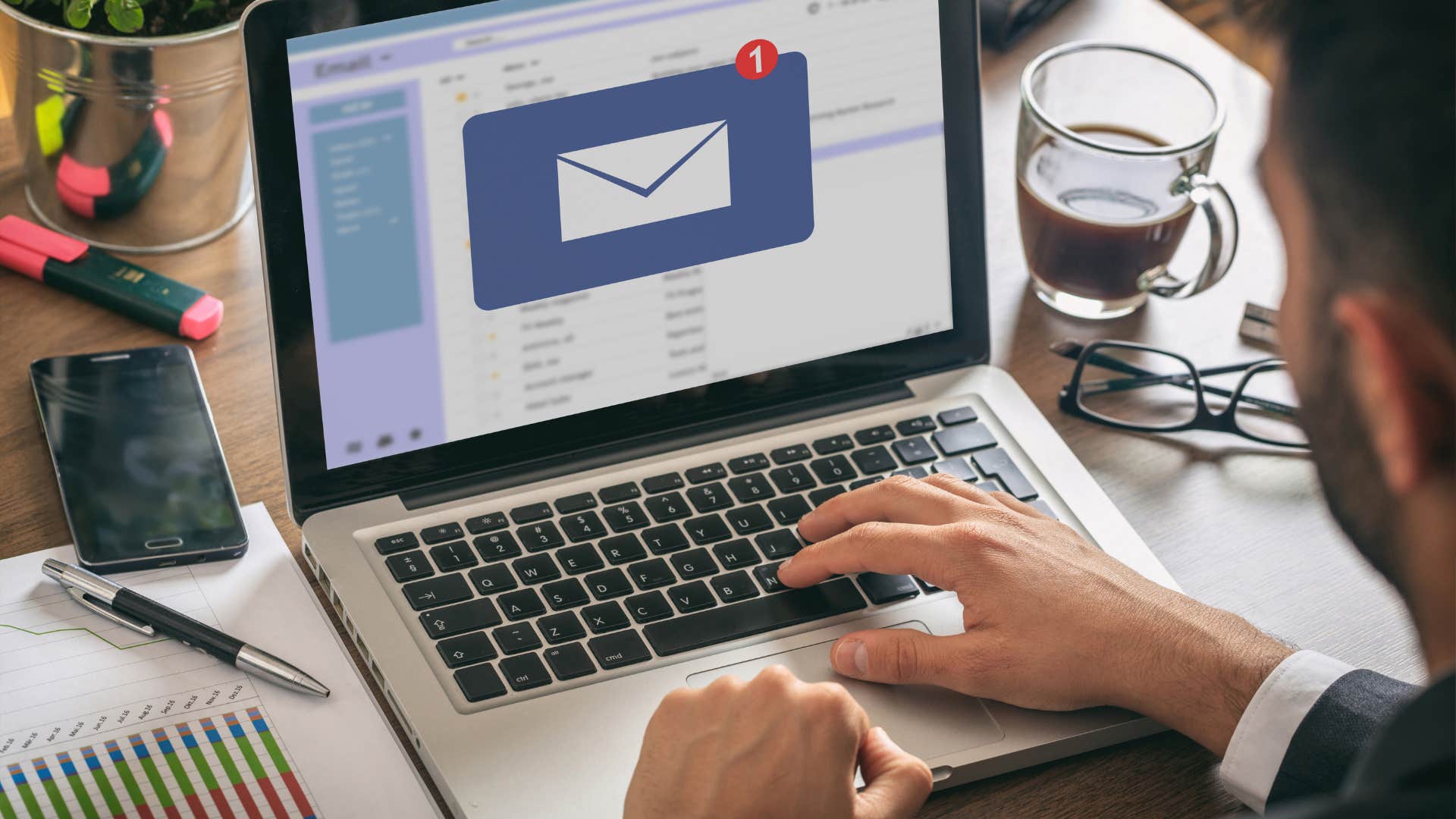11 Things People Notice Immediately When You Share Your Screen During A Meeting
You're not as slick as you thought you were. Everyone noticed it.
 DS Tkachuk / Shutterstock
DS Tkachuk / Shutterstock Virtual meetings have delivered some of the most cringeworthy moments for people who work remotely. I can specifically recall thinking I was muted and yelling some idle threats at my kids, only to return to the meeting to see a bunch of wide-eyed colleagues. I had to convince them that I was totally not serious about drop-kicking my son into next week.
If you have to share your screen during a meeting, the chance for humiliation goes through the roof. You've opened the window into your digital world, and everyone can see how you operate. Screen sharing is a modern-day vulnerability in a world where our images are cultivated with precision. Sharing your screen is equivalent to sharing your life, so make sure you've cleaned your desk and hid those questionable tabs because everyone is watching, and they will notice little things immediately.
Here are 11 things people notice immediately when you share your screen during a meeting
1. Your dirty desktop
 Polina Zimmerman from Pexels via Canva
Polina Zimmerman from Pexels via Canva
If your desktop is a disaster zone, people will see it right away the moment you start sharing. If you have a million icons and no rhyme or reason for organizing them, you might be considered messy or disorganized. I wish I could say that your colleague won't judge you simply because you didn't put your documents neatly into folders before you shared, but that would be a lie.
Professionally, people will judge you, and a cluttered desktop might seem akin to a cluttered mind. They start to say things like, "No wonder she can't find the file I asked for." You probably know exactly where everything is, but others will find your messiness off-putting. Try creating a folder called "Meeting Parking Lot" where you move all your unnecessary desktop items pre-meeting, as if you are expecting company.
2. Your telling browser tabs
 Natee Meepian's Images via Canva
Natee Meepian's Images via Canva
I am extremely irked when someone has too many tabs open on their browser, so when they share their screen, I'm naturally skimming through them to see what is so relevant that you cannot close the tab, and so are the rest of the attendees. Everything you've recently opened will not be relevant to the meeting, or even the job at all.
That half-read article called "Signs It's Time To Leave Your Dead-End Job" or that LinkedIn quick-apply tab that tells everyone who sees it that you are trying desperately to get out of there is not a good look, professionally speaking. So close out your shopping, dating, social media, and job search tabs if you want to avoid a very uncomfortable conversation.
3. Your way too personal bookmarks
 Peopleimages from Getty Images Signature via Canva
Peopleimages from Getty Images Signature via Canva
Whether you know it or not, people are work are very nosy. Not only will they skim through your open browser tabs, but they will also check out your bookmarks to see what you've saved for later. It's all about what you've named them. If one of them is "Attorney for work lawsuit," for example, red flags will be raised that can be super awkward.
Bookmarks at work should be professional work-related, so avoid things like "Cheap Beyonce Tickets" or "How to beat your narcissistic boss at their own game." Those little labels speak volumes when you are in the hot seat, so make sure that whatever screen you decide to share is being displayed just as you intended it to. That way, you can avoid unforced issues.
4. Your notifications popping up
 kate_sept2004 from Getty Images Signature via Canva
kate_sept2004 from Getty Images Signature via Canva
Can we all admit that we might say something that is borderline inappropriate to our work bestie on Slack or Teams? Perhaps it's about your annoying manager, or maybe the two of you are going in on a co-worker's outfit. Either way, you would hate for a notification to pop up mid-presentation for everyone to see.
Your friend sent you a funny meme about Sally in Finance, or your calendar reminder popped up to make sure you know that you have an upcoming therapy appointment. Either way, you are ready to disappear into thin air. Remember that if you are hosting and sharing, silence those notifications to avoid mortification.
5. Your interesting background image
 PeopleImages from Getty Images Signature via Canva
PeopleImages from Getty Images Signature via Canva
The background of your virtual meeting tells people everything they need to know about you. If it's blurred, they know that you might not have had any idea of what you wanted to put up, but you knew for certain you didn't want them in your home. A motivational quote in the background might tell them that you are inspired and want to spread the love to everyone else.
On the other hand, themes like Scarface or anime might not be the best and could even be considered unprofessional or inappropriate. As a reminder, your desktop background is a tool for personal branding. It can lead to particular conclusions about who you are as a person, so make sure it is conveying the right message
6. Your questionable file names
 Zinkevych from Getty Images via Canva
Zinkevych from Getty Images via Canva
When it comes to files, it's always better to have a system of naming them that makes them easy to find and hard to misplace. But it is also important to make sure the names are workplace appropriate to avoid unintentionally insulting someone. I can recall working as a manager at a company. One of my reports shared their screen, and one of the files was called "Wendy's nonsensical spreadsheet." As you might imagine, that did not go over very well.
File names can be either hilarious or embarrassing, depending on the audience. They can also give some insight into your mental state, which people love to try decoding. When it comes to professional environments and naming files, remember that less is more. These should be a short description, based on facts, not feelings.
7. That one tab you forgot to close
 Roberto Hund from Pexels via Canva
Roberto Hund from Pexels via Canva
Maybe it's a YouTube video, or some work for a second job you've been moonlighting at. Either way, everyone has that one tab they forgot was open before sharing their screen during a meeting. You don't even notice it until everyone in the virtual room is giving you a blank stare that lets you know your browsing activities are now public knowledge.
As soon as you share your screen, it's like everyone's eye zooms in on the unsavory open tab that seems to be flashing neon when you're in the hot seat. Close out anything that's personal, confidential, or unrelated to the meeting beforehand to make sure that you don't have any snafus that derail you or land you in a meeting with Human Resources.
8. The fact that you are clearly multitasking
 StockLite via Canva
StockLite via Canva
If you think you can toggle between two different tasks while also sharing your screen in a meeting, I've got bad news for you. Everyone notices. Even though you are not sharing the screen with your Etsy or Amazon shopping cart, or your fantasy football team, it's clear that your attention is divided and your eyes are diverted. Multitasking is an easy way to come across as disinterested and disengaged.
You might think those sudden attention shifts are subtle, but they are far from it. Eye movements, changes in posture, and delayed responses are just a few of the telltale signs that your focus is elsewhere. Generally, if you're sharing your screen during a meeting, you are the host and should set the example by being present and attentive. How do you expect others to listen to you if you can't even stay on task for 30 minutes?
9. Your tech choices
 jhorrocks from Getty Images Signature via Canva
jhorrocks from Getty Images Signature via Canva
The MAC versus PC argument has been around for some time. Many believe that the one you choose says a lot about your personality. PC users are assumed to be more conservative and less sophisticated when it comes to their choices in media. Whether you believe it or not, the technology you choose can lead your professional connections to make some assumptions about your personality that may or may not be true.
People notice your tools and setups more than they do the actual presentation. You might not intend to, but you are inadvertently joining a tech tribe by simply sharing your screen. They notice the most minute things that you would not think would matter. Chrome or Safari. Light or Dark Mode. For people watching your presentation, technology could be the determining factor on whether they like you or not.
10. The fact that you were ill-prepared
 ANTONI SHKRABA production from Pexels via Canva
ANTONI SHKRABA production from Pexels via Canva
Nothing is worse than being called on to present in a virtual meeting and being wholly unprepared. You're stuttering, looking for documents, and uncertain as to how to use the Zoom or Teams features, and it shows. As you fumble around trying to find what you're looking for, judgmental eyes stare at you in disbelief over how you could be so unprepared.
That frantic shuffle between window and files, coupled with the awkward silence from the audience, is one of the most uncomfortable experiences on the planet. It's like someone popping up at your messy house when you weren't expecting company. You let them in, and now you must scramble to pick up clothes that are lying around and wash the dirty dishes piled up in the sink.
11. Your unopened emails
 Rawf8 from Getty Images via Canva
Rawf8 from Getty Images via Canva
You share your screen and realize you need to pull up an email for reference. Everyone gets to watch you dig through your inbox in search of the right correspondence. But what they also notice is that your inbox has hundreds of unopened messages. Now it all starts to make sense; your late responses, your claims that you didn't receive this or that.
Seeing that you are comfortable with chaos can form negative opinions about you and the way that you work. A laundry list of outstanding tasks, ignored communications, and overdue assignments can quickly turn you into a liability in the professional realm. If and when you decide to share your desktop during a virtual meeting, make sure it is presentation-ready and leaves your audience with the intended impact.
NyRee Ausler is a writer from Seattle, Washington, and the author of seven books. She focuses on lifestyle and human interest stories that deliver informative and actionable guidance on interpersonal relationships, enlightenment, and self-discovery.

